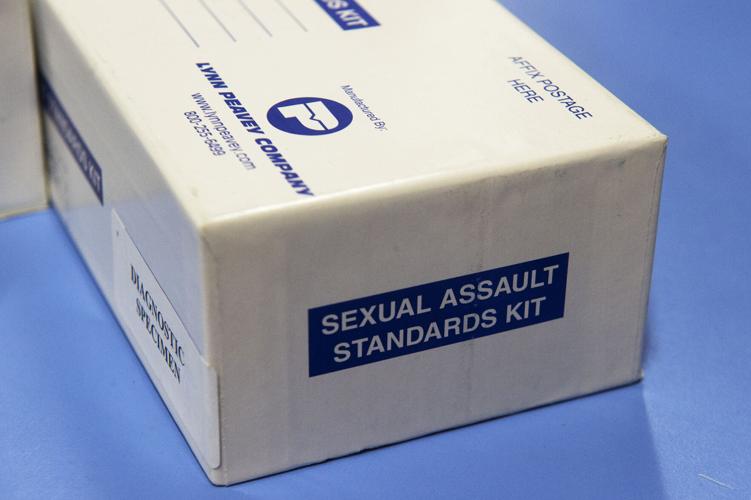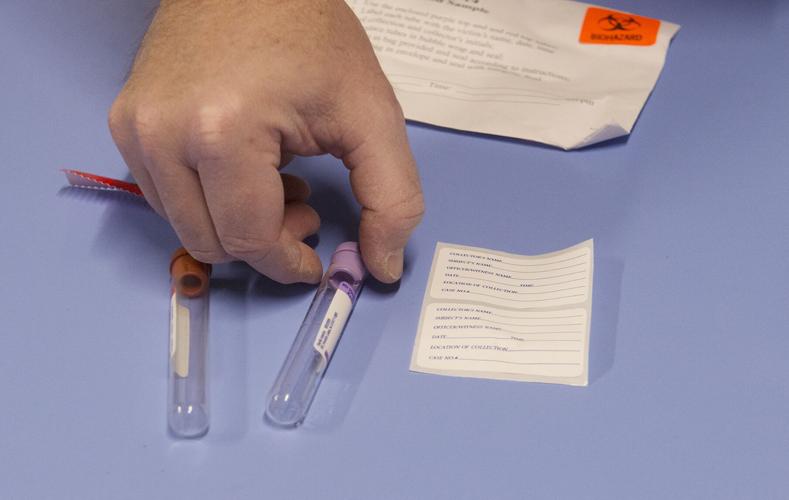Many area law enforcement agencies clear backlog of untested sexual assault kits - Joplin Globe


A renewed effort to clear the backlog of untested sexual assault kits in Missouri is showing promising results as many law enforcement agencies in the region now report zero untested kits in their inventories.
The Missouri Attorney General’s Office worked with 169 law enforcement agencies to clear their backlogs of untested, reported sexual assault kits throughout the state. A total of 3,298 kits were tested using a 2018 federal grant from the Bureau of Justice Assistance and a $2.6 million appropriation from the Missouri Legislature.
Seventy-four police and sheriff’s departments in Southwest Missouri that worked with the state now have zero untested, reported sexual assault kits in their inventories, Attorney General Eric Schmitt said.
Schmitt launched the SAFE Kit Initiative in Missouri three years ago to help clear the backlog of untested, reported sexual assault kits. He credited M. Keithley Williams, a former Jasper County trial judge who now leads the statewide initiative, and her team for its success.
There are currently three active prosecutions that are a direct result of CODIS hits from kits that were tested through the initiative, the attorney general said. The Combined DNA Index System, known as CODIS, is a computer software program that contains local, state and national DNA databases and allows users to compare DNA profiles electronically. It stores DNA profiles of convicted offenders and missing persons and DNA profiles from crime scene evidence.
“While this is a major accomplishment, there is still work to be done,” Schmitt said. “My office has worked with the Missouri State Highway Patrol to send referrals to prosecutors when CODIS hits are encountered and will continue to do so.”
A sexual assault kit, offered free of charge to the patient, allows medical professionals to collect evidence from the victim. Taking part in such an exam can be very traumatizing for the victim, said Susan Hickam, executive director of Joplin’s Lafayette House, which serves adults, children and families experiencing domestic violence, sexual assault or substance use disorders.
“Testing these kits can empower victims to know that their case is moving forward, and there is action being taken,” she said. “It really gives a victim a sense that someone’s listening, someone’s paying attention, and they may, in some way, have some sort of resolution to the case. Resolution doesn’t necessarily mean making someone whole again, but it’s part of the process.”
In Southwest Missouri
Several law enforcement agencies in Southwest Missouri have zero untested sexual assault kits on their shelves after working with the attorney general’s office to reduce the statewide backlog.
Joplin police Chief Sloan Rowland said there has been a lot of positive movement on clearing the backlog of untested kits with assistance from the state. In 2020, the Joplin Police Department reported having 43 untested sexual assault kits. Now, the department has zero.
“It was a great thing, and the state came out with a deal and funded it for the first round,” Rowland said. “Then the funding disappeared, so we waited and got a second round. We didn’t know if we were going to get the third round to the point that we started looking at outside vendors to try to take care of the backlog.”
Rowland said it was difficult to find a crime lab in the region that wasn’t experiencing a backlog; other departments were having the same issues with little funding and few agencies able to test kits. The Joplin Police Department receives sexual assault kits from other area law enforcement agencies to be sent to the crime lab.
“We had finally found a lab, but there was almost an eight-month backlog and wait to get in, so it was fortuitous to us that the state found the money and did that final round” of funding, Rowland said. “We served as a hub three times, and we collected everyone’s kits from the entire area around this part of Missouri and held them. The state came down and picked them up. Currently, we have no pending sexual assault kits.”
Don Melton, Webb City police chief, said his department’s kit inventory also is empty. The Webb City Police Department had three untested kits in 2021 and one this year. Melton said all four were taken and tested through the state.
“It’s pretty amazing how quickly they’ve been able to process the tests once they get it,” he said. “We appreciate that they’re doing it for us.”
The Carl Junction Police Department has zero untested kits, said Stephanie Castlebury, detective and evidence officer.
Jasper County Sheriff Randee Kaiser said his department had a few untested kits sent to the state a while ago, although he couldn’t recall the exact number.
“We closed that file a long time ago,” he said.
The Newton County Sheriff’s Department also has no kits that have gone untested at this time, Detective Wanda Williams said.
“We have worked with the attorney general to make sure they have received all the kits,” she said.
Background
The Missouri Attorney General’s Office surveyed law enforcement agencies, crime labs and health care providers that process sexual assault kits throughout the state in 2017 and found 4,889 untested, reported kits. The office received a three-year Sexual Assault Kit Initiative grant from the Bureau of Justice Assistance in late 2018 to help eliminate the backlog.
Schmitt’s office is currently conducting an updated inventory that covers backlogged kits from 1998 to April 2020 with another round of grant funding from the SAKI program.
Hickam, of Lafayette House, said it is great that the state is working to clear the backlog and prosecute cases whenever possible.
“We could potentially be putting a stop to something that is continuously happening to other people,” she said.
The state of Kansas also has been cracking down on untested sexual assault kits. The Kansas Sexual Assault Kit Initiative is led by the Kansas Bureau of Investigation, which identified more than 2,200 previously submitted sexual assault kits in March 2017.
Kansas Gov. Laura Kelly earlier this month signed bipartisan legislation that requires sexual assault kits to be tested within 30 days of collecting the evidence. The bill also gives law enforcement the option to collect evidence at child advocacy centers, where child victims may feel more safe and comfortable.
“Survivors of sexual assault deserve peace of mind and assurance that the justice system is working diligently to prosecute their abuser,” Kelly said in a statement. “The delays they’ve faced are unacceptable. This commonsense legislation accelerates justice and enforcement of crime victims’ rights.”
Cherokee County Sheriff David Groves said his department adopted a policy several years ago requiring sexual assault kits to be submitted within 30 days.
“This new law only serves to back up what our current policy and practice has been,” Groves said. “At the time of the adoption of that policy, we did not have any outdated assault kits which had not been tested, but knew there was an issue nationwide with them not being tested in a timely manner for a variety of reasons.”
source: https://www.joplinglobe.com/news/local_news/many-area-law-enforcement-agencies-clear-backlog-of-untested-sexual-assault-kits/article_7bc91354-bc2b-11ec-bded-cfdad422a8e0.html
Your content is great. However, if any of the content contained herein violates any rights of yours, including those of copyright, please contact us immediately by e-mail at media[@]kissrpr.com.

